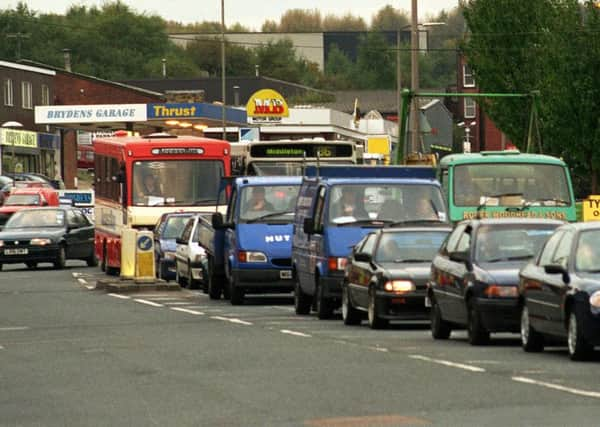Colin Speakman: Failing to invest puts our planet on the road to hell


Desertification and crop failures in much of Africa is resulting in starvation, political conflict and mass migration. Eminent scientists warn we are close to the point when catastrophic changes to our climate will become unstoppable.
World leaders are trying to act. The Paris Treaty adopted by 195 countries, including the UK, is the first-ever universal, legally binding global climate deal that sets out a global action plan to put the world on track to avoid dangerous climate change by limiting global warming to well below 2C.
Advertisement
Hide AdAdvertisement
Hide AdTransport, largely fossil fuel-powered, is the fastest rising source of human-induced carbon emissions, especially road and air transport. Reducing such emissions are at the heart of the Paris Treaty.
However, in the alternative universe of UK national transport policies, it is not only business as usual, but decisions that lead in the absolute opposite direction. Colossal sums of money are being earmarked for new road schemes and massive airport expansion, such as the third Heathrow runway. In our own region, Leeds Bradford Airport plans huge expansion. A £6bn project has been announced to build a gigantic road tunnel under the Peak District to carry the A628 between Manchester and Sheffield. This will generate yet more journeys by car and truck to pour onto the M1 or already gridlocked M60 Ring around Manchester. For a fraction of that amount of money – perhaps just £1bn – Leeds, the only city or regional capital of its size in Europe without a metro or underground, could have its desperately needed Light Rapid Transit System.
Meanwhile public transport, the alternative to the car, is being starved of cash. Rising fares are forcing people to be ever more dependent on their cars. It is now cheaper to fly from Leeds to Bristol or Aberdeen than take the more environmentally friendly train. This is collective insanity.
Motoring has never, in real terms, been cheaper. So the Government, in order to win easy votes, has cancelled the fuel duty escalator in order to keep petrol prices low, whilst allowing bus and rail fares to rise faster than inflation. The result is record car sales and increasing car usage.
Advertisement
Hide AdAdvertisement
Hide AdWe are now seeing the rapid emergence of three and even four-car families, ever more horrendous road and parking congestion in town, cities and suburbs. Gridlock is now a daily experience. Buses in traffic jams are seen as expensive, slow and unreliable. Air quality is so bad in Leeds that a scandalous 600 premature deaths per year are caused by traffic fumes.
What is being done is a case of ‘too little, too late’. Hopefully the residual token £175m of Government money given to Leeds after the cancellation of the NGT trolleybus scheme is going to be spent on bus park and ride schemes, perhaps using electric vehicles. The fatal weakness of such schemes is that they have been tried before – and failed.
During the early 1970s city planners devised The Leeds Approach, based on a new Inner Ring Road, pedestrianisation of some streets (which did occur) but also drastic control of cars in the city centre to give priority to a fleet of buses from outlying car parks. As soon as traffic restriction measures were announced, howls of outrage from city traders and motoring lobbyists killed the project. Already there are demands to spend the NGT money on yet more road schemes, despite overwhelming evidence that this will simply generate even more commuter traffic.
Traffic congestion in Leeds, Sheffield, Bradford and York is now so severe it only needs the smallest incident or public event to produce gridlock. Buses in the same traffic jam become hopelessly unreliable with frequent cancellations, resulting in even greater car use, and cuts in service as operators, losing passengers, slash costs.
Advertisement
Hide AdAdvertisement
Hide AdThings will only change when traffic chaos gets so dreadful politicians will be forced to act and seek radical solutions. Such solutions can only involve real investment in alternative travel – on our local rail networks, replacing the 30-year-old worn-out trains, opening more stations and even new lines (a Light Rapid Transport system on old tramway reservations from East Leeds would be one quick win) and giving buses speed advantage over the private car by creating segregated busway systems.
Health-giving walking and cycling must be the top priority for many short journeys, including new traffic free routes to and from public transport hubs. We also need to understand the horrific consequences, saving trivial amounts of money, but resulting in yet more congestion as rural dwellers drive into city centres.
Change will happen, but maybe only when the full horror of the collapse in the world’s ecosystem begins to hit home. But by then it may be too late.
Colin Speakman is chairman of the North & West Yorkshire Campaign for Better Transport.